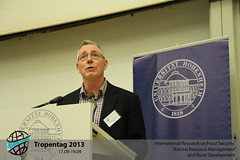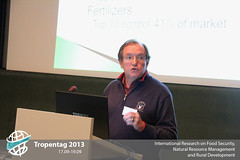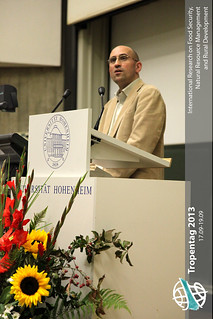Kirstin Ohlendorf's blog
Let’s keep it informal!
Wed, 09/25/2013 - 17:35 — Kirstin Ohlendorf
In the breakout session on “Leveraging Value Chains for better nutrition and food safety: Lessons for CGIAR Research”, Delia Grace from ILRI in Nairobi Kenya highlighted the importance of the informal sector. Research indicates that in many low income countries, e.g. milk is marketed via informal markets and this trend to supermarkets is not valid for all countries – also not with regards to consumer preferences.
Furthermore the informal sector is highly relevant for women who can sell their products in an informal way, but at the same time highly risky in terms of food safety.
Is the formal sector better?
It should be a women’s world?
Wed, 09/25/2013 - 15:52 — Kirstin Ohlendorf
The presentation Agricultural pathways to improved nutrition: getting the policies right by Prabhu Pingali focused on the creation of a policy environment which supports the Agriculture - Nutrition Nexus – instead of the current Agriculture versus Nutrition Silos!
Are toilets an indicator for the peri-urban area?
Thu, 09/19/2013 - 16:32 — Kirstin Ohlendorf
One of the biggest challenges of the conference theme “rural-urban continuum” was the definition of the rural and urban landscape. In the view of Jefferson Fox from the East West Center, Honolulu (USA), this distinction between urban and rural is not useful when large areas and populations are caught between the two.


The only continuum is the one of exploitation and poverty!
Thu, 09/19/2013 - 09:54 — Kirstin Ohlendorf
The session started of with an awakening keynote speech from FIAN
President Dr. Flavio Luiz Schieck Valente. He asked researchers to use science to influence politics, because politicians have an impact on people’s lives. His presentation did not focus on the continuum as such, but rather on what actually happens to the people in the continuum?


What do cauliflower in Bangladesh, groundnuts in South Africa and wild vegetables species in Nepal have in common?
Wed, 09/18/2013 - 18:00 — Kirstin Ohlendorf
… they all played an important role in the session on vegetable production within the rural-urban continuum, which not only offered insights into a lot of plant varieties, but also into a wide variety of topics from web based collaborative research between Thailand and Germany, via cauliflower cultivation in Dhaka to the cultivation of early Bambara groundnut for urban markets in Limpopo Province (South Africa).
Do you eat less meat to prevent climate change?
Tue, 09/17/2013 - 20:33 — Kirstin Ohlendorf
So far, energy and climate policies have been rather unsuccessful in reversing climate change. In order to avoid negative effects, like danger of food security or water supply, it is essential to drastically cut down on global GHG emissions.


Kirstin Ohlendorf - Student Reporter 2013
Mon, 09/16/2013 - 11:17 — Kirstin Ohlendorf




